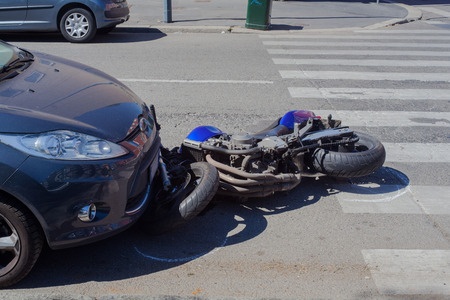Motorcyclists Are Vulnerable – 2015 Safety Tips for Drivers
December 7, 2015 | Category: Motorcycle Accidents | ShareAs our population in Southwest Florida increases, so does traffic. Many of us remember when I-75 was first changed from a two-lane into a three-lane highway. It seemed as though there was plenty of driving space for everyone, but not anymore. Motorists including private vehicles, construction trucks, delivery trucks, buses, up to 18-wheelers and motorcycles now must share a very congested roadway. There is not just a “rush hour,” but many rush hours throughout the day. Traffic can be moving, but moving at 40 to 50 miles per hour, not the speed limit of 70 miles per hour. With this scenario, all of us must be mindful that motorcyclists are particularly vulnerable.
 Motorcycles, because of their size, do not handle the same way as other larger vehicles. The Motorcycle Safety Foundation (MSF) wants vehicle drivers to know:
Motorcycles, because of their size, do not handle the same way as other larger vehicles. The Motorcycle Safety Foundation (MSF) wants vehicle drivers to know:
- Over half of fatal motorcycle crashes involve another vehicle.
- Because of the motorcycle’s small size, it can be hidden or masked by objects or backgrounds. It also may look farther away than it really is.
- Motorcyclists may not activate the brake light because they often stop by downshifting or merely rolling off the throttle.
- Motorcyclists often adjust their position in a lane to be better seen or to minimize the effects of road debris, wind, or passing vehicles.
- Turn signals on motorcycles, unlike those on other vehicles, are not self-cancelling. So if a motorcyclist does not remember to turn off the turn signals, they will stay on.
- The stopping distance for motorcycles is nearly the same as for cars. However, if the pavement is slippery, the distance increases and becomes more difficult for the motorcyclist to stop.
Motorists have a responsibility to drive safely at all times and to be particularly attentive to their surroundings. Ride Smart Florida provides some useful safety tips (below) for motorists when driving where motorcyclists may be sharing the road.
- Search the traffic around you constantly and expect to see motorcycles.
- Check your blind spots before changing lanes or merging, especially in heavy traffic.
- Double-check traffic at intersections before you turn or pull out.
- Motorcycles can easily be hidden in traffic. Look for a helmet above, tires below, or a shadow alongside a vehicle that you can't see around.
- Leave at least a four-second distance between your car and a motorcycle in front of you. Note when a motorcycle passes a point in the road. If your vehicle passes the same point in less than four seconds, you’re following too closely.
- When passing a motorcycle, give a full lane to the motorcycle. Do not share lanes.
- Keep a watchful eye at all times. Individual motorcycles may blend into a larger group and may be closer than you think.
- Watch out when turning left because most crashes between cars and motorcycles occur when vehicles are making left turns at intersections.
- Stay attentive and focused because distracted driving is a major cause of car-motorcycle crashes.
- Make sure to always signal when changing lanes to ensure the motorcycle rider knows what action you intend to take.
- Remember that failing to yield right of way can result in the death or serious injury of a motorcyclist.
- Make sure to observe and obey all traffic laws, signs, and signals.
“We at Spivey Law Firm, Personal Injury Attorneys, P.A. leverage the special laws and protections that apply to motorcycle accident cases in Florida to help motorcycle accident victims obtain compensation. These laws enable motorcycle accident injury victims to recover for damages sustained as a result of a motorcycle accident, including pain and suffering, loss of the enjoyment of life, long and short-term medical care expenses, and lost wages,” says Florida Motorcycle Accident Attorney, Randall Spivey.
Florida Motorcycle Accident Attorney, Randall L. Spivey is a Board Certified Trial Attorney – the highest recognition for competence bestowed by the Florida Bar and a distinction earned by just one (1%) percent of Florida attorneys. He has handled over 2,000 personal injury and wrongful death cases throughout Florida. For a free and confidential consultation to discuss your legal rights, contact the Spivey Law Firm, Personal Injury Attorneys, P.A., in Lee County at 239.337.7483 or toll free at 1.888.477.4839,or by email to Randall@SpiveyLaw.com. Visit SpiveyLaw.com for more information. You can contact Spivey Law Firm, Personal Injury Attorneys, P.A.in Charlotte County at 941.764.7748 and in Collier County 239.793.7748.

